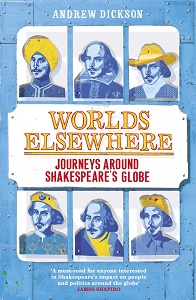| Journey in Search of Shakespeare Round the World |
Theatre Writer Book |
| Andrew Dickson “Worlds Elsewhere” , The Bodley Head , December 1, 2017 |
 Pamela Petro, Massachusetts author and ardent Cymrophile, wrote a first book “Travels in an Old Tongue”. In it she travelled the world encountering pockets of Welsh and Welshness everywhere. In the remotest metropolitan area on earth, in down-town Perth, the biggest retailer is called “David Jones.” So too it is with Andrew Dickson. He is interested in how Shakespeare has flowed just about everywhere. Sure enough in Hong Kong his introductory guide is Dean of Drama, Ceri Sherlock.
Pamela Petro, Massachusetts author and ardent Cymrophile, wrote a first book “Travels in an Old Tongue”. In it she travelled the world encountering pockets of Welsh and Welshness everywhere. In the remotest metropolitan area on earth, in down-town Perth, the biggest retailer is called “David Jones.” So too it is with Andrew Dickson. He is interested in how Shakespeare has flowed just about everywhere. Sure enough in Hong Kong his introductory guide is Dean of Drama, Ceri Sherlock. The full title of his book is “Worlds elsewhere : Journeys around Shakespeare's Globe” and it is long, 480 pages. It has a fifteen page bibliography, is well-indexed and is journalistic in style. That is a compliment to indicate accessibility and readability. Its interest in considerable. As a small item of the literary world Dickson wrote about Dominic Dromgoole's book on Shakespeare (reviewed here June '17) unflatteringly. Dromgoole had previously reviewed Dickson's earlier book and called the author “a man whose Uber-Pooterishness is so beyond self-parody that is becomes almost endearing.” He also noted reviews of productions that were “lazily and airily dismissive”, adding that one of them had been his. Literary snipery apart “Worlds Elsewhere” is filled with moments of discovery to fascinate. Dickson opens with a performance of “The Comedy of Errors” from the Globe’s 2012 Festival of Global Shakespeare. The place is Kabul and sets him wondering. “Why was Shakespeare, a writer who barely travelled, so popular globally? And why had he been not only adapted, but adopted, in so many countries worldwide?” He looks for answers in four locations. Gdansk, formerly contested German Danzig, was surprisingly a city which saw a group of English players construct a theatre early in the seventeenth century. 1611 was the year of “the Tempest” in Britain and that year British actors were twice in Danzig. Dickson moves to Weimar, the high Olympus of German culture. Schlegel's peerless translation yoked Will of Stratford across the North Sea. Probing into the German Shakespeare Society Dickson quotes snippets of academic declaration from the past. Hermann Ulrici: “we want to de-Anglicise the English Shakespeare. We want to Germanise him.” Karl Fulda: “we have an undeniable right to call him ours, because we have made him thanks to German industry, German spirit and German scholarship.” Nationalism took its short-lived deadly descent into hell and took Shakespeare with it. In 1936 Professor Hans Gǔnther's reading of Shakespeare had turned him into a full-blown eugenicist. Reverence for Shakespeare from the United States started early. Thomas Jefferson on a visit to Stratford lowered himself to kiss the ground. The young republic had a preference for the republican message of “Julius Caesar”. Dickson finds an account from 1851 by the Edinburgh writer J D Borthwick of a rumbustious “Richard III” in Nevada City. Henry Folger began his collection of the folios and other documents. The Folger Library in Washington DC now holds 256,000 books, 250,000 playbills, 60,000 manuscripts, 200 paintings. In the theatre of pre-1989 Eastern Europe the court of Elsinore was amplified to be a place of uniforms and surveillance. In South Africa in 1970 “Titus Andronicus” in the Afrikaans language was set in a fascist Rome. Dickson gives a good summary of the country's brave theatre flourishing led by Barney Simon and Janet Suzman. He summarises the history of China's theatre back to its first recorded origins. In the modern day he records how in 2011 the Chinese Premier made a three-day state visit to Britain. The plane landed at Birmingham Airport which allowed him to visit the local Chinese-owned car plant. But he too wanted to make his pilgrimage to Stratford. When the Premier had been a young man copies of Shakespeare in Chinese had been put on public bonfires. The leading playwright, the translator of “Hamlet”, was denounced, arrested and tortured. Dickson roams back in time to Voltaire in exile both wonderstruck and appalled by what he sees on London stages. In the present day he philosophises as to why the world has revered and absorbed Shakespeare. His theories are several but perhaps Samuel Johnson had it nailed down a time back. The plays are “the real state of sublunary nature...in which, at the same time, the reveller is hastening to his wine, and the mourner burying his friend.” |
Reviewed by: Adam Somerset |
This review has been read 1755 times There are 34 other reviews of productions with this title in our database:
|
